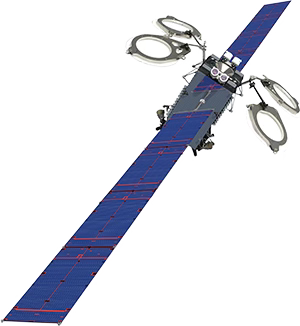Middle East Space Roundup: 9 to 15 September 2024
A summary of all the space news in the Greater Middle East over the past week, brought to you by AzurX
World Space Business Week 2024 in Paris kicks off September 16th to 20th. The Middle East Space Monitor will be in Paris all week to cover the event as an official media partner.
The following are the major space developments in the Greater Middle East region tracked by Middle East Space Monitor over the past week:
UAE Space Developments
UAE Space Agency Participates in G20 Space Economy Leaders Meeting in Brazil
At the G20’s 5th Space Economy Leaders Meeting in Brazil, a UAE delegation led by Eng. Salem Butti Al Qubaisi, Director-General of the UAE Space Agency, highlighted the country’s advancements in space exploration and its contributions to economic growth and sustainability. The UAE’s presence underscored its burgeoning space sector, with a focus on key initiatives such as the Space Data Centre and the Space Economic Zones Programme. This participation reflects the UAE's commitment to leveraging space technology for broader economic and sustainable development goals.
Report Claims UAE in Talks with South Korea, China, on Missile Early Warning Satellites
The ever-unreliable Tactical Report claims that the UAE is actively pursuing ambitious goals to enhance its military space capabilities. The country aims to strengthen its strategic security over the next four years through extensive collaboration with international partners willing to transfer and localise space technologies. Ongoing talks are primarily centred on companies from South Korea as well as, the publication asserts, discussions with the China National Space Administration (CNSA), China’s civil space organisation that does not deal with military space matters. In any event, Tactical Report claims that these two countries have been chosen for their relatively flexible conditions on technology transfer. The publication asserts that the discussions are focused on technologies for ballistic missile early warning systems and land and maritime facilities monitoring, activities that CNSA are explicitly not involved in. While finalising agreements may take time, TR says that negotiations are progressing smoothly. This initiative is part of a broader strategy to acquire advanced early warning systems and develop local manufacturing capabilities for military satellites. The UAE's proactive approach in seeking technology transfer and production agreements underscores its commitment to bolstering its strategic defence capabilities and achieving greater technological self-reliance in the space sector.
UAE’s Mira Aerospace Successfully Completes First HAPS Flight in the Country
Mira Aerospace, a leading entity in High Altitude Platform Station (HAPS - also known as High Altitude Pseudo-Satellite) technology, has successfully completed a series of HAPS flights in the UAE. This achievement underscores Mira Aerospace's role in advancing the UAE's aerospace industry and enhancing its global reputation. The tests, conducted from Abu Al Abyad Island, involved high-altitude flights carrying advanced Earth observation payloads, focusing on applications for environmental monitoring and data collection. This success aligns with the UAE's ambitious goals in aerospace innovation and supports Bayanat's transition into Space42, following its merger with Yahsat. Mira Aerospace's HAPS technology, which provides sustainable, long-duration flights using solar energy, offers a significant leap in Earth surface monitoring and data acquisition, bridging gaps between satellite and terrestrial systems. This development not only demonstrates the UAE's growing technological expertise but also sets the stage for future advancements in global space and environmental monitoring solutions.
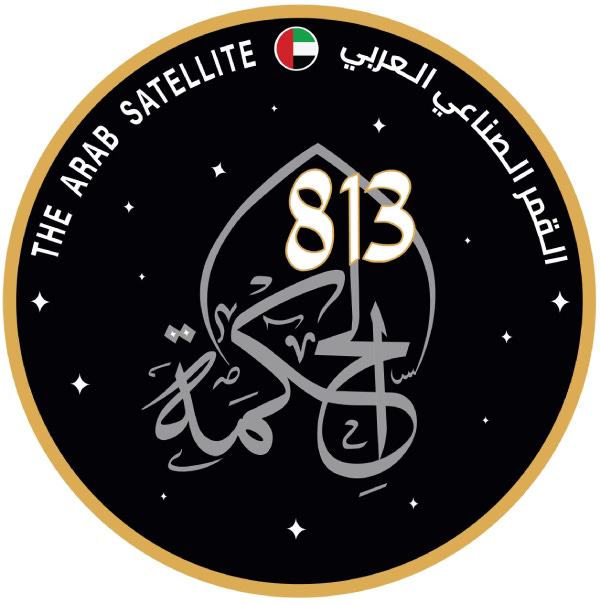
Arab Space Cooperation Group’s Satellite 813 to be Launched by China in 2025
A consortium of Arab countries, the Arab Space Cooperation Group (ASCG), has developed a small Earth observation satellite, named 813, which is scheduled for launch aboard a Chinese carrier rocket in June 2025. The satellite, named after the year 813 AD to honor the Islamic Golden Era's scientific advancements, aims to enhance regional space capabilities and foster unity among Arab countries. The hyperspectral technology, a new field for the consortium, is designed to capture detailed data across multiple wavelengths for applications in Earth observation, mineral exploration, and environmental monitoring. The satellite will aid in monitoring agricultural patterns and water resources, with particular focus on addressing drought issues in Sudan. Developed at the UAE University's National Space Science and Technology Centre (NSSTC), the satellite reflects the collaborative spirit of the Arab Space Cooperation Group, which seeks to advance space technology through regional cooperation.
UAE’s Space Marketplace Signs MoU with France’s Access Hub for Space Media Services
Space Marketplace, a UAE-based platform connecting users with advanced space solutions, has signed a Memorandum of Understanding (MoU) with Access Hub, a French company specialising in space, defence, and media technology consulting and marketplaces. This partnership aims to foster global collaboration by combining Space Marketplace’s regional strength with Access Hub’s European expertise. The MoU will facilitate cross-border business opportunities and joint ventures, enhancing access to new markets and innovative projects. Both platforms will also host joint events to promote networking and knowledge sharing. The agreement represents a strategic move to drive technological advancement and expand business growth internationally.
UAE’s Bayanat and G42 at Forefront of Exploiting AI in Satellite Data
Microsoft’s $1.5 billion investment in UAE AI firm G42 has spotlighted the company’s role in accelerating AI advancements in the Gulf region. Since its establishment in 2018, G42 has heavily invested in AI R&D, exemplified by its partnership with Cerebras Systems to develop the Condor Galaxy—a global network of nine AI supercomputers aimed at revolutionising AI model training. This initiative underscores G42’s ambition to enhance commercial and research capabilities in various sectors, including energy, healthcare, and climate change. Additionally, Bayanat, an integral part of G42, leverages decades of geospatial data to deploy AI solutions for disaster management, including the recent launch of the UAE's first synthetic aperture radar (SAR) Earth observation satellite to improve detection capabilities. As AI and Large Language Models (LLMs) evolve, G42’s advancements are positioning the UAE at the forefront of global AI innovation and practical applications in disaster response and environmental monitoring.
UAE’s MBRSC and Azercosmos Trains Azerbaijani Students in Space Technology
The UAE’s Mohammed Bin Rashid Space Centre (MBRSC) recently hosted Azerbaijani students for an intensive week-long learning experience, part of a collaborative effort with the Space Academy of Azercosmos and Azerbaijan’s Innovation and Digital Development Agency. The programme provided practical sessions, technical challenges, and research assignments guided by MBRSC experts, covering areas such as space systems, computer engineering, and astronaut training. Participants engaged with key MBRSC projects like the Emirates Lunar Mission and Emirates Mars Mission, and explored advanced topics including AI and satellite observation. The initiative, which also featured a master class by Nora Al Matrooshi, the UAE’s first female astronaut, aims to inspire future space scientists and engineers. MBRSC’s outreach reflects its commitment to international cooperation and STEM education, emphasising the role of such programmes in advancing global space science and technology.
Israel Space News
Analysts: Time for Abraham Accords 2.0 that Includes Space Cooperation
In RealClearWorld, Aryeh Lightstone and Asher Fredman write that the Abraham Accords, signed four years ago by Israel, UAE, Bahrain, Morocco, and Sudan, marked a transformative shift towards peace and cooperation in the Middle East. Amid the challenges of the COVID-19 pandemic, these agreements spurred significant advancements in trade, travel, and collaborative projects across various sectors, including space, AI, and sustainable development. However, the recent escalation of violence, notably Hamas' 7 October 2024 attacks and Iran's proxy network's actions, has threatened regional stability. Despite these setbacks, there is a renewed urgency to advance the Abraham Accords 2.0, which aims to broaden peace initiatives to include more Arab and Muslim countries and drive forward economic, technological, and security collaborations. Achieving this goal will require robust American leadership and a comprehensive strategy that integrates diplomatic, economic, and security efforts to maintain and expand the gains of the Abraham Accords.
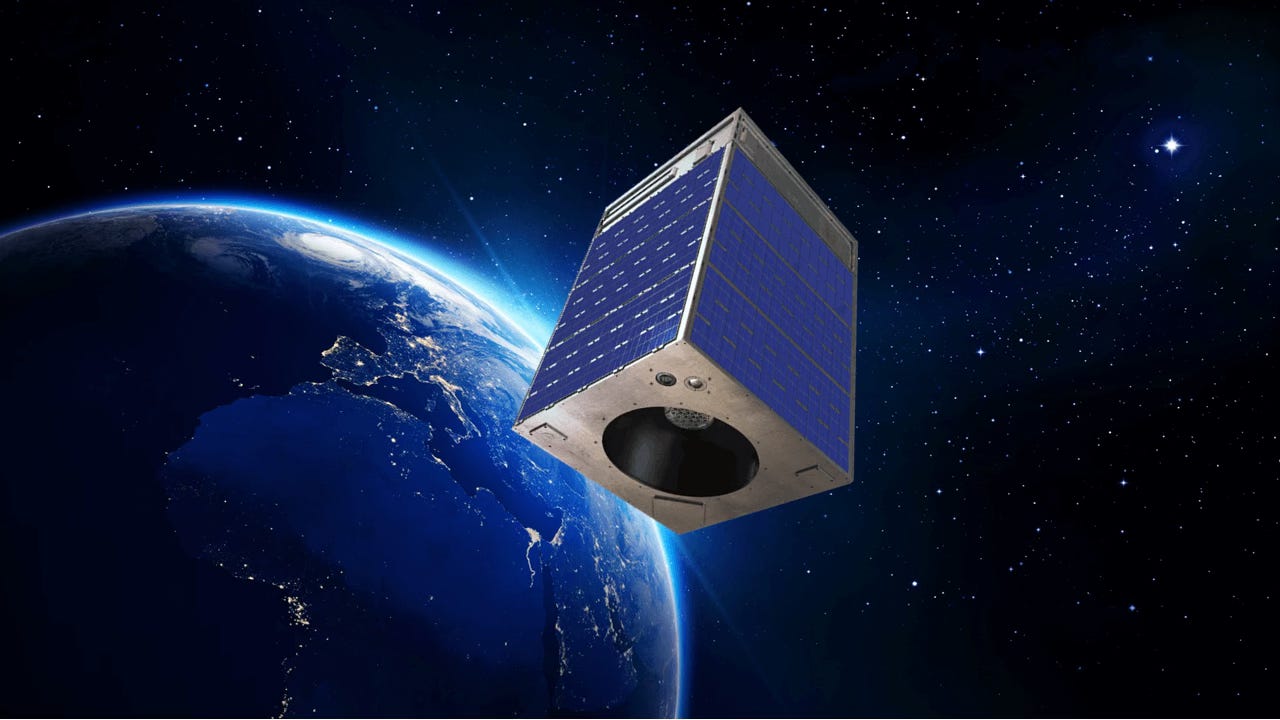
Israel’s ImageSat International Secures Significant Satellite and Geospatial Data Contracts
Israel’s ImageSat International (ISI) has secured a contract to deliver two RUNNER advanced high-resolution Earth observation satellites to a customer in Asia. The RUNNER satellites feature innovative electro-optic designs that provide sub-meter, true-colour imagery and video, with both day and night capabilities. Integrating edge-computing and AI applications, these satellites are expected to revolutionise traditional operations. Additionally, ISI will offer space-based intelligence analytics services via its GeoImpactTM platform, using data from its EROS NGTM constellation and the upcoming GlobalEyeTM constellation to an unnamed international defence entity. Noam Segal, ISI's CEO, highlighted that this agreement represents a significant milestone for ISI, showcasing its leadership and growth strategy in the space-based geospatial intelligence sector.
Israel Commits to Train Female Astronaut with NASA for Artemis Moon Programme
Israel is advancing its space exploration efforts by training its first female astronaut as part of NASA’s Artemis programme, a move announced by Innovation, Science, and Technology Minister Gila Gamliel during her visit to NASA’s Johnson Space Center. This initiative underscores Israel's commitment to advancing science and technology and promoting gender equality in STEM fields. Gamliel also emphasised strengthening cooperation between NASA and the Israel Space Agency, including extending Israeli research on the International Space Station and participating in the Artemis programme, which aims to return astronauts to the Moon. Notably, Israeli scientists are developing the AstroRad vest, a radiation shielding suit tested in Artemis missions, while Israeli companies explore partnerships for deep space exploration through the Creation-Space accelerator programme.
Israel’s SpaceIL Conducts Successful Simulated Beresheet-2 Lunar Landing
Israel’s Beresheet-2 lunar mission, spearheaded by SpaceIL, recently made progress despite ongoing financial constraints by completing a successful simulated lunar landing. Collaborating with Sim.space, the simulation encompassed all phases of the autonomous landing, from detachment at 40 kilometers above the Moon to touchdown, with precise modeling of landing parameters. This simulation, conducted purely on a computer so far, will soon integrate into a hybrid lab for testing and validating lander components. SpaceIL plans to deploy two landers, one on the near side and one potentially on the far side of the Moon, with the mother spacecraft remaining in lunar orbit. The mission has faced budget issues since major donors reduced their support, prompting efforts to secure government funding and international partnerships. Despite these challenges, the mission continues to advance, with a focus on refining simulations to address potential malfunctions.
Israeli-Founded Tomorrow.io Adds Two New Weather Satellites to its Fleet
Israeli-founded weather forecasting company Tomorrow.io has recently expanded its satellite network with the launch of two new microwave satellites, bringing its total to four. The new satellites, deployed on SpaceX's Transporter 11 mission, are classified as 6U, measuring approximately 10x10x10 cm each, and operate within the 20 to 200 GHz frequency range. They are designed to measure atmospheric humidity and temperature with high precision by analysing wave reflections affected by water vapour and ice particles. Currently in the testing and calibration phase, these satellites are anticipated to enhance weather forecasting accuracy, particularly over oceans and remote areas where traditional data is sparse. Tomorrow.io aims to establish itself as a leading private weather forecasting entity, a sector traditionally dominated by government and military institutions. The company has raised over $100 million in funding and secured significant contracts, including one with the U.S. Department of Defense, as it continues to advance its satellite array.
UK Subsidiary of Israel’s Ramon.Space Gets UK Space Agency Funding
Ramon.Space UK, a subsidiary of Israel’s Ramon.Space Ltd., has been selected to develop next-generation digital onboard processors for large-scale communication constellations, supported by funding from the UK Space Agency. This initiative aims to advance the capabilities of satellite communications through the NuComm processor, a cutting-edge technology designed for high-capacity, low-power, and cost-efficient digital solutions. NuComm’s reconfigurability in orbit enhances operational efficiency, resilience, and lifecycle longevity of low-Earth orbit (LEO) constellations. The UK Space Agency's backing not only fosters innovation but also bolsters Ramon.Space’s expansion in the United Kingdom, creating high-skilled jobs and reinforcing the UK's leadership in space technology. This programme highlights a significant leap in AI-based, software-defined space technologies and positions Ramon.Space as a key player in the evolving satellite communications market.
Iran Space Developments
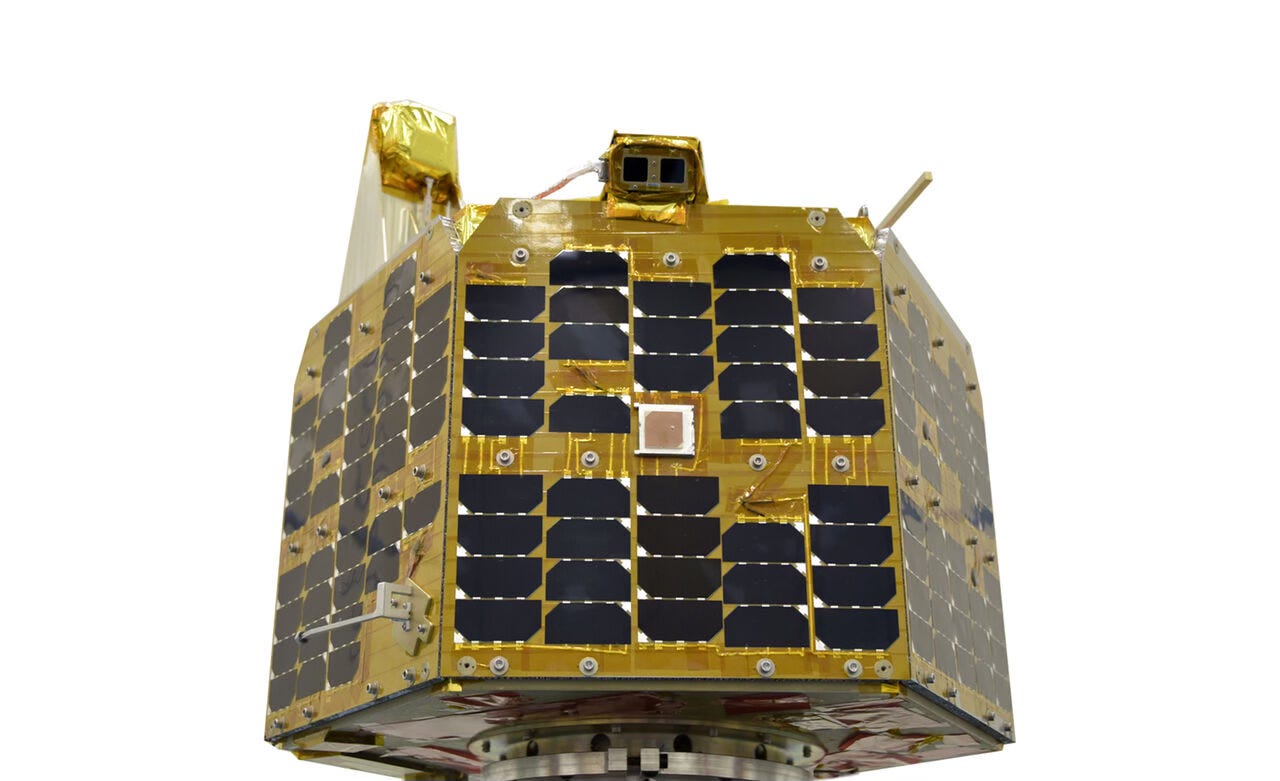
Iran Successfully Launches Chamran-1 Research Satellite on IRGC Solid-Fueled SLV
On 14 September 2024, Iran successfully launched the Chamran-1 research satellite into orbit, marking a significant advancement in its space programme. The satellite was placed into a 550-kilometer orbit aboard the domestically developed Qaem-100 space launch vehicle, a solid-fuel, three-stage rocket created by the Aerospace Force of the Islamic Revolution Guards Corps (IRGC). Designed and built by Iran Electronics Industries in collaboration with the Aerospace Research Institute and private firms, the 60-kilogram Chamran 1 aims to validate orbital manoeuvre technology and test various space systems, including propulsion and attitude control subsystems. This launch follows Iran's earlier deployment of the Mahda satellite and further demonstrates the country's growing capabilities in satellite development and space exploration, despite ongoing international sanctions.
Iran’s IRGC to Launch Qaem-105 Satellite Launch Vehicle in 2025
The commander of the Space Division of the Islamic Revolutionary Guard Corps (IRGC) Aerospace Force, Brigadier General Ali Jafarabadi, announced that Iran plans to launch the Qaem-105 satellite launch vehicle (SLV) and the Noor-4 satellite in the next Iranian calendar year starting 21 March 2025. This follows the successful launch of the Chamran-1 satellite, which was placed into a 550 km orbit by the Qaem-100 SLV. The Chamran-1, weighing approximately 60 kg, aims to test orbital manoeuvre technology. Both the Qaem-100 carrier, developed by the IRGC, and the Chamran-1 satellite, built by Sairan Company under the Ministry of Defence, signify significant advancements in Iran's space capabilities. Brigadier General Jafarabadi acknowledged the contributions of the late President Raeisi’s administration in advancing Iran’s space objectives. Iran also announced plans to launch its second satellite under the current administration using the Simorgh SLV, following the successful deployment of the Chamran 1 research satellite.
Starlink SATCOM Terminals Circumventing Iran’s Attempts to Censor the Internet
Recent developments in Iran suggest a growing interest in Starlink satellite internet terminals as a means to circumvent the government’s stringent internet filtering. Despite the high costs of Starlink terminals, which are significantly inflated in Iran, social media has seen a surge in posts showing these devices being installed on rooftops. Starlink’s technology, though currently unauthorised in Iran, offers a potential solution for accessing uncensored internet. However, the use of Starlink in Iran involves substantial risks, including the need to smuggle devices from neighbouring countries and potential prosecution for possessing unauthorised equipment. The Iranian government has responded by demanding licensing from SpaceX and filing complaints with the International Telecommunication Union (ITU), which led to a ruling in Iran’s favour. Additionally, the government continues to employ satellite jamming and internet blackouts to maintain control over online content. Despite these measures, the increasing use of Starlink terminals, potentially reaching up to 20,000 units, underscores the persistent demand for unrestricted internet access amidst severe state control.
Iran Proposes BRICS Security Commission for Addressing Satellite, Other Threats
At the 14th Meeting of BRICS High-Ranking Officials Responsible for Security Matters in Russia, Ali Akbar Ahmadian, Secretary of Iran's Supreme National Security Council, proposed the establishment of a BRICS Security Commission to enhance global security. Highlighting the evolving geopolitical landscape, Ahmadian suggested that BRICS, leveraging its economic and demographic power, could pioneer a new international security framework. This proposed commission would address a range of common threats including terrorism, extremism, cyber threats, and the misuse of emerging technologies such as artificial intelligence and satellites. Ahmadian argued that such a structure would complement BRICS's economic cooperation and strengthen its role in global security.
Türkiye Space News
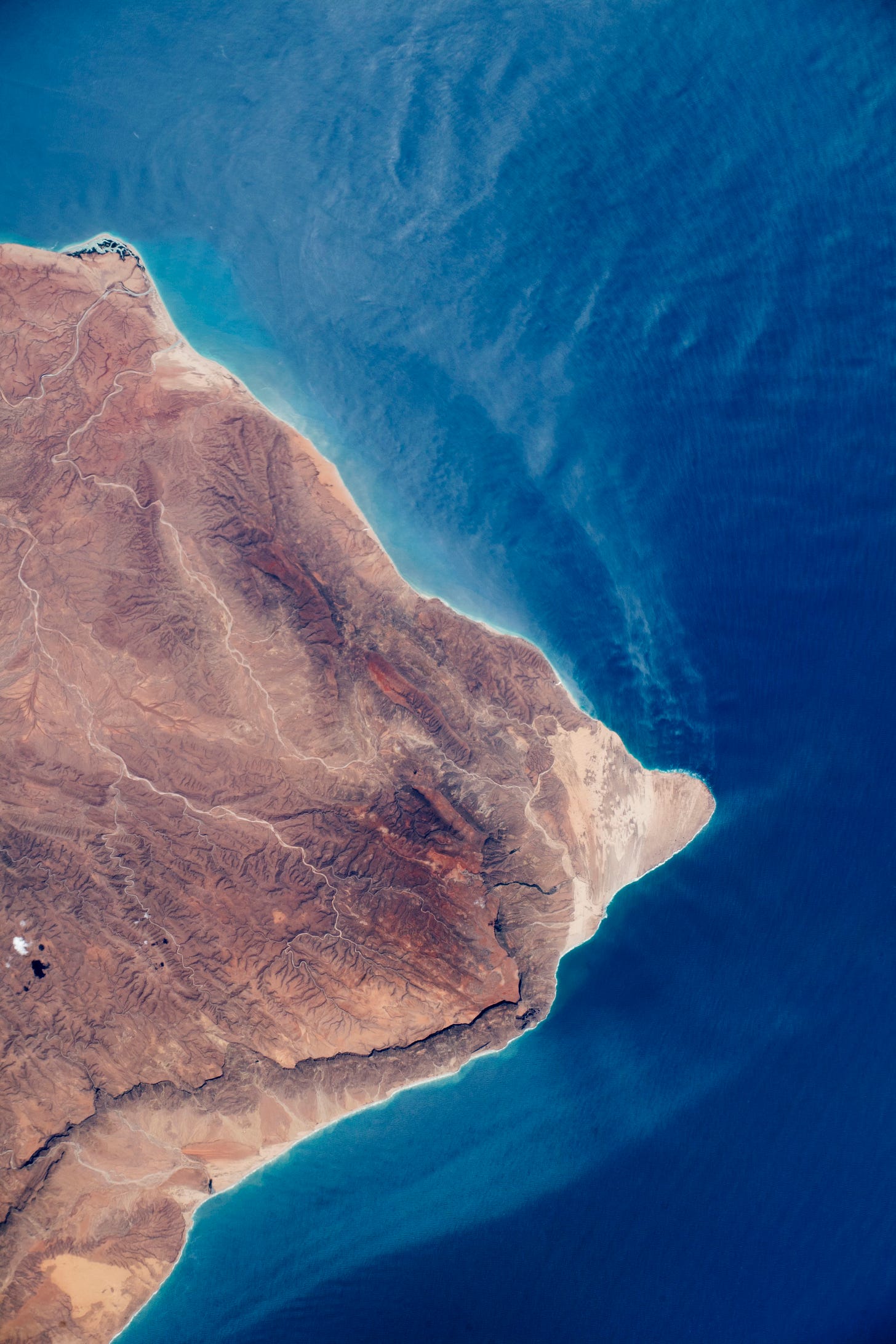
Türkiye in Talks with Somalia to Build Space Launch Site on Horn of Africa
Türkiye is in discussions with Somalia to establish a site for testing missiles and launching space vehicles, leveraging Somalia’s strategic location on the Horn of Africa. The region's proximity to the equator is advantageous for both ballistic-missile testing and space launches, potentially enhancing the performance and range of Türkiye's space and missile technology. This initiative aligns with Türkiye's broader ambitions to advance its space programme and strengthen its defence capabilities. Türkiye’s involvement in Somalia includes significant defence and infrastructure investments, with plans for further economic cooperation and energy exploration. Somalia, however, has been plagued by civil strife, terrorism, and political violence for decades, and may provide insurmountable logistical and security challenges to Turkish ambitions to establish a launch site there. Still, the proposed launch site reflects Türkiye’s growing influence in the region and its efforts to enhance its strategic foothold in Africa amid shifting international dynamics.
Türkiye’s Fergani Space to Build National GNSS Satellite Constellation
Selçuk Bayraktar, Chairman of the TEKNOFEST Board and Technology Leader at Baykar, has highlighted significant advancements in Türkiye’s independent global navigation satellite system (GNSS) project, led by the Turkish space company Fergani Space. Bayraktar, during a live broadcast on TRT, outlined the project's ambition to deploy a constellation of approximately 100 low-Earth orbit satellites, with the first satellite launch planned for 2024. This initiative, which aims to reduce Türkiye's dependency on foreign positioning systems, is being funded by revenues from Türkiye’s burgeoning drone industry. Fergani Space is also working on orbital transfer vehicles and plans to construct 50-ton launch vehicles by 2030, reflecting Türkiye's strategic focus on achieving technological sovereignty and advancing space capabilities.
Türkiye’s First Astronaut, Alper Gezeravci, Appointed to Turkish Air Force’s Space Command
Alper Gezeravci, Türkiye's first astronaut, has been appointed to the Turkish Air Force's Space Command, marking a significant development in the country's space programme. Announced by Rear Admiral Zeki Akturk, this appointment reflects Türkiye’s expanding capabilities across various defence domains, including space. Gezeravci, who previously completed Türkiye’s inaugural human space mission to the International Space Station, will contribute to the Space Command's organisational efforts under the National Space Programme. This appointment underscores Türkiye's commitment to advancing its space sector and enhancing its global space capabilities, aligning with broader goals such as the establishment of an international spaceport by 2030 and continued investment in space technology and satellite projects.
Türkiye’s Türksat Embraces Space Sustainability with its Own Solar Power Plant
Türkiye's sole satellite communications operator, Türksat, has inaugurated a major solar power plant at its Gölbaşı Campus, marking a significant step in the country's commitment to renewable energy and space sustainability. The 131-acre facility, which began construction in April 2023 and is now operational, is expected to generate 15 million kWh annually, fulfilling the energy needs of all Türksat campuses in Ankara and resulting in annual savings of $1.77 million. This initiative aligns with Türkiye's broader strategy to combat climate change and reduce carbon emissions by increasing the use of renewable energy sources. The solar plant not only supports Türksat’s digital infrastructure and e-Government services but also enhances the institution's energy independence and sustainability. The project demonstrates a payback period of less than three years, including operational and maintenance costs, further underlining its economic and environmental benefits.
Saudi Arabia Space Developments
Saudi Arabia’s Neo Space Group Outlines Future Plans in Interview
Saudi Arabia’s Neo Space Group (NSG), a new entrant in the Middle Eastern space sector, is spearheading Saudi Arabia's ambitions in space technology as part of the Kingdom’s Vision 2030 initiative. Supported by the Public Investment Fund (PIF), NSG aims to leverage advanced satellite technologies to enhance satellite communications, geospatial services, and positioning, navigation, and timing (PNT) across Saudi Arabia. Additionally, NSG will invest in space startups through its venture capital arm. In a recent Via Satellite Thursday Morning Conversations, CEO Martijn Blanken discussed the company's strategic goals and potential impact on the global satellite market, emphasizing NSG’s role in driving technological advancements and economic diversification within the Kingdom. The interview can be viewed here:
Saudi Arabia and South Africa Near Agreement on Space Cooperation
Saudi Arabia and South Africa are nearing the completion of a memorandum of understanding (MoU) to bolster their collaboration in the space sector, as announced by South Africa's Minister of Science, Technology and Innovation, Dr. Bonginkosi Blade Nzimande. This MoU, to be implemented by the respective space agencies, aims to develop joint satellite projects and enhance national space capabilities. The agreement aligns with Saudi Arabia’s broader goals under its Vision 2030 initiative and South Africa’s recent advancements, such as the establishment of the Space Weather Centre. Discussions between Nzimande and Saudi Minister of Communications and Information Technology, Eng. Abdullah Al-Swaha, also touched upon integrating artificial intelligence with space technology, reflecting a strategic effort to deepen bilateral cooperation and explore policy synergies.
Saudi Arabia Participates in G20 Space Economy Leaders Meeting in Brazil
At the G20 Space Economy Leaders Meeting in Foz do Iguaçu, Brazil, Saudi Arabia, represented by the Saudi Space Agency (SSA) and led by CEO Dr. Mohammed Al Tamimi, focused on the role of space in addressing environmental challenges and advancing sustainable development. The meeting, which included G20 member space agencies and international organisations, centered on the theme "Space Economy and Climate Change: Challenges and Opportunities." Dr. Al Tamimi highlighted Saudi Arabia’s dedication to enhancing the global space economy, emphasizing the establishment of the Centre for Space Futures in collaboration with the World Economic Forum as a key initiative to drive international innovation and economic growth. This meeting marks a significant milestone in the Kingdom's G20 presidency, underscoring its commitment to leveraging space data for sustainable development and global health. While at the G20 SELM in Brazil, Dr. Al Tamimi and the Saudi space delegation met with counteparts from the Indian Space Research Organisation (ISRO) and the Brazilian Space Agency.
Saudi Arabia and Brazil Sign Space Cooperation Agreement
Saudi Arabia and Brazil have formalised a bilateral agreement to enhance their cooperation in the exploration and peaceful use of outer space. Signed during the G20 Space Economy Leaders Meeting (SELM) in Foz do Iguaçu, Brazil, the agreement involves a wide range of activities, including space science research, remote sensing, space communications, space biology, weather monitoring, and satellite development. Dr. Mohammed bin Saud Al Tamimi, CEO of the Saudi Space Agency (SSA), highlighted the Kingdom's ambition to lead the global space economy, projected to reach $2 trillion by 2035, under the support of Crown Prince Mohammed bin Salman. The agreement underscores SSA's commitment to advancing international collaboration and innovation in the space sector, reflecting its broader strategy to foster global partnerships and drive scientific progress for humanity’s benefit.
Saudi Arabia’s KAUST Hosts Earth Observation Satellite Workshop
In response to the burgeoning global space market, Saudi Arabia’s King Abdullah University of Science and Technology (KAUST), in partnership with the Communications, Space, and Technology Commission (CST), hosted the "SpaceTech Empowerment: Opportunities in the Earth Observation Market" workshop under the Space Entrepreneurship Alliance (SEA). The workshop convened experts from both public and private sectors to discuss regulations, future directions, and opportunities in Earth observation services, following CST's landmark decision to license Neo Space Group (NSG) for these services. This initiative is part of CST's broader strategy to stimulate investment and bolster Saudi Arabia's global position in the space industry. The workshop also showcased KAUST's role as a pioneer in space-based Earth observation, including its nanosatellite system and the KAUST Climate Change Center, which supports diverse applications from environmental monitoring to disaster management. KAUST's Vice President Ian Campbell highlighted the workshop's role in advancing collaborative efforts and transforming strategic partnerships into impactful outcomes for the Kingdom and beyond.
Azerbaijan Space News
Azerbaijan’s Azercosmos Participates in G20 Space Economy Leaders Meeting in Brazil
Azercosmos, Azerbaijan’s state space corporation, participated in the 5th G20 Space Economy Leaders Meeting, held from 11-13 September 2024 in Brazil as part of the G20 summit. The meeting, focusing on "Space Economy and Climate Change: Challenges and Opportunities," aimed to advance discussions on the global space economy's role in addressing environmental issues and achieving sustainable development goals. Dunay Badirkhanov, Vice-Chairman of Azercosmos, spoke on Azerbaijan’s space sector development and its impact on both local and international space communities. He highlighted the significance of the 2023 International Astronautical Congress (IAC) in Baku and invited sector representatives to COP29 in November 2024. The summit attracted global leaders from G20 countries, space agencies, and international organisations, underscoring its importance in shaping the future of space and climate initiatives.
Azerbaijan’s Azercosmos Signs Deal with ABS Satellite for Satellite Broadcasting in West Africa
Azercosmos, Azerbaijan’s state space corporation, has forged a strategic partnership with global satellite operator ABS Satellite to deliver pay-TV services across Nigeria and West Africa. This collaboration, formalised at the IBC 2024 conference, will leverage ABS's satellite network to enhance Azercosmos' service offerings in the region. The agreement not only positions Azercosmos to capitalise on new revenue streams by commercialising both its own and ABS's satellite resources but also aims to elevate the quality and reach of video services available to West African customers. Fuad Aslanov of Azercosmos emphasised the partnership's potential to broaden commercial opportunities and improve service quality, while ABS's Ramsey Khanfour highlighted the strategic importance of this alliance in expanding their market presence and meeting rising demand for high-quality satellite solutions.
Azerbaijan’s Azercosmos Provides Satellite Communications Training in Mozambique
Azercosmos, the state space corporation under Azerbaijan’s Ministry of Digital Development and Transport, recently showcased its expertise to representatives from Mozambique’s Communication Institute. The training programme provided foundational knowledge on critical aspects of space operations, including radio frequency management, orbital positioning, and satellite application processes, along with current ITU satellite regulations. This initiative reflects Azercosmos's broader strategy of exporting space knowledge, which began last year. The agency's training programme aims to enhance space capabilities in developing countries across Africa, Central Asia, and the Middle East, marking a significant step in international space collaboration and capacity building.
Egypt Space Developments
CEO of Egyptian Space Agency Outlines Egypt’s Space Plans for Next Several Years
In an exclusive interview with Vijaya Cherian of SatelliteProME, Dr. Sherif Sedky, CEO of the Egyptian Space Agency (EgSA), outlined Egypt's ambitious advancements in space technology and its strategic initiatives for the coming years. Dr. Sedky discussed key projects, including the African Development Satellite, developed in collaboration with five African countries, and the partnerships with UNOOSA and Airbus aimed at enhancing Egypt's technical capabilities and fostering international cooperation. EgSA is also driving innovation through the SPINX initiative, which supports space technology startups. Located in Egyptian Space City, EgSA boasts extensive facilities for satellite design, assembly, and testing, achieving significant localisation with 60% of nanosatellites and 40% of microsatellites built domestically. Dr. Sedky highlighted recent missions like NexSat-1 and MisrSat-2, and emphasised ongoing efforts to expand Egypt’s satellite constellation, enhance remote sensing capabilities, and strengthen global partnerships. Looking ahead, EgSA is focused on overcoming challenges related to high development costs and specialised skills through capacity building and international collaboration, while also promoting STEM education and regional space cooperation.
Analyst: Egypt has a Greater Role to Play in Developing International Space Law
Egypt, leveraging its historical expertise in astronomy and space science, is well-positioned to contribute to evolving space law and policy, reflecting the broader challenges and opportunities in managing the domain, according to Egyptian lawyer Ibrahim Wagdy writing in Ahram Online. The evolution of legal systems from ancient to modern times illustrates the growing complexity of human societies and their regulatory frameworks. Initially driven by the transition from nomadic to settled agricultural communities, early legal systems addressed ownership and resource management. Roman Law significantly influenced contemporary legal systems, introducing principles like res communis (shared resources) and res nullius (ownerless property). These concepts underpinned modern maritime law, with the 1982 United Nations Convention on the Law of the Sea (UNCLOS) managing global commons and Exclusive Economic Zones. The rise of space exploration further necessitated legal innovation, resulting in treaties such as the 1967 Outer Space Treaty, which governs activities in outer space. However, the rapid advancement of space technology has outpaced legal developments, revealing gaps in addressing issues like space debris, space militarisation, and space mining. The increasing congestion of space and the potential for conflicts over extraterrestrial resources highlight the need for updated regulations.
Other Regional Space News
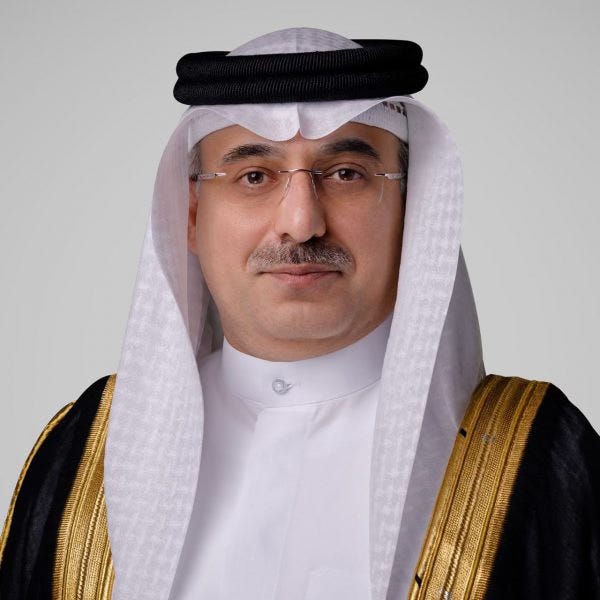
Bahrain’s NSSA Participates in 10th Arab Space Cooperation Group Meeting
The National Space Science Agency (NSSA) of Bahrain participated in the 10th session of the Arab Space Cooperation Group (ASCG) during the Egypt International Aviation and Space Exhibition 2024 in El Alamein City. Led by Dr. Mohamed Al Aseeri, the NSSA delegation reported on updates and proposals from the 14 Arab member states, focusing on joint space projects and capacity building. Key outcomes included recommendations for enhancing regional space collaboration and promoting sustainable development through space technology. Dr. Al Aseeri praised the Egyptian Space Agency for organizing the event, highlighting its importance in advancing Arab space efforts. Amal Al Benali, Head of Strategic Planning and Projects at NSSA, reaffirmed Bahrain's commitment to the ASCG's goals.
Qatar’s Es’hailSat Exhibits its Satellite Communications Services at IBC 2024
At the IBC 2024 exhibition in Amsterdam, Qatar’s Es’hailSat showcased its satellite assets, Es’hail-1 and Es’hail-2, and its 50,000 sqm teleport facility in Doha. The satellites, positioned at the 25.5°/26° East hotspot, are crucial for delivering high-quality direct-to-home (DTH) television across the Middle East and North Africa, with Es’hail-2 featuring advanced anti-jamming technology. The teleport facility supports a range of services including satellite transmission, tracking, and disaster recovery, enhancing Es’hailSat’s capabilities beyond its local market. Ali Al Kuwari, Es’hailSat's President and CEO, emphasised that the IBC event provides a strategic platform for demonstrating their expanded services and engaging with global customers and partners.
Qatar’s Al Jazeera Media Network to Use Eutelsat for European Broadcasts
Eutelsat Group has secured a multi-year, multi-satellite agreement with Qatar’s Al Jazeera Media Network to maintain the broadcast of its SD and HD news and events channels across three critical Eutelsat video neighbourhoods. This renewal guarantees Al Jazeera's continued presence in key regions: the 7/8° West position for the Middle East and North Africa, Eutelsat HOTBIRD at 13° East for Europe, and Eutelsat 16A at 16° East for Central and Eastern Europe. Laurence Delpy, President of Eutelsat’s Video Business Unit, emphasised the agreement’s significance in ensuring the extensive reach of Al Jazeera’s content, while Ahmed Marzouq Al Fahad of Al Jazeera highlighted the network's satisfaction with Eutelsat's broad coverage and reliability.
Iraq’s Saba WORLD to be Broadcast Across Middle East by Eutelsat Group
Eutelsat Group has secured a multi-year contract with Iraq’s Saba WORLD to deliver free-to-air educational content across the MENA region, in collaboration with Iraq’s Ministry of Education. Utilising the extensive coverage of EUTELSAT-7 West A, which serves the 7/8° West video neighbourhood and reaches 95% of homes in the region, this partnership aims to enhance educational access for students and educators in Iraq and beyond. Laurence Delpy, President of Eutelsat's Video Business Unit, emphasised that this agreement underscores the vital role of satellite technology in advancing educational objectives and expanding access to learning resources, particularly in underserved areas.
Oman Announces Tender for National Space Accelerator Programme
In alignment with Oman Vision 2040, the Ministry of Transport, Communications and Information Technology (MTCIT) has launched a tender for the Space Accelerator Programme, managed by the National Centre for Space, Advanced Technology, and Artificial Intelligence. This initiative aims to bolster Oman’s space sector by supporting local entrepreneurs and integrating advanced technologies in areas such as communications, Earth observation, AI, and unmanned aerial vehicles. The programme will offer resources, funding, and mentorship to SMEs, promoting innovation and global expansion. The focus is on enhancing the sector's economic impact and attracting investment, reflecting Oman’s strategic emphasis on space-related ventures. The deadline for obtaining tender documents is 22 September 2024.
Be sure to catch up with space activities in the region in the next edition of Middle East Space Monitor’s space roundup!





